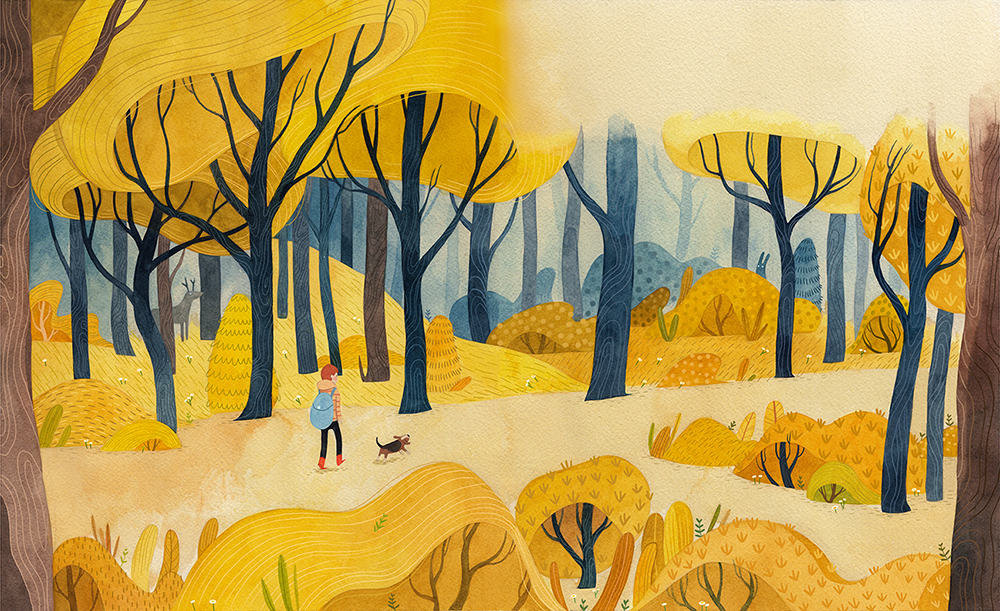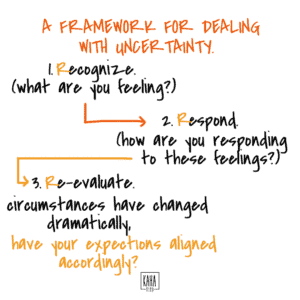
Art by Vivian Mineker
Several weeks into a global pandemic, many of us find ourselves attempting to craft a new “normal”. This we do while we are locked away at home and trying to (virtually) hold down the fort at work. Many more are heading back to the drawing board.
Has this been stressful? Yes. Will this continue to be stressful? Possibly.
In the best of circumstances, we function on plans, assumptions, predictions, perhaps a few hunches. But this lockdown has upended many old ways of functioning and brought in uncertainty. Key factors that anchored our decisions may no longer be accessible.
Uncertainty is a hard reality. We can’t control it. We can however control our response to it.
This article hopes to provide a framework for handling this. The decisions are yours, but we hope that the process leading to it might be made easier.
-
Recognize- Where are you now mentally?
Uncertainty usually generates a lot of emotions. You might feel anxious, exhausted, stressed, struggle with “not knowing”. This is only expected and natural given these extraordinary circumstances.
Give yourself the space to feel it, label it, recognize it. Beating it down would suppress it but eventually boomerangs back. If you’re feeling “not okay”, not able to specifically name one feeling- that is fine too. Being mindful of when you experience ‘spikes’ in unpleasant feelings might tell you what is triggering you.
Awareness of triggers and what you are feeling is really helpful in establishing a sense of control since you’re no longer battling a complete unknown.
-
Respond- How are you responding to these emotions?
Now that you’ve established how you’re feeling. How do you respond to that? Is there a voice in your head that goes- “You can’t be feeling this. You can’t afford to” or does it say “I’m just not strong enough” Here’s a question- Is it helpful when you think along these lines?
If you’re invalidating, blaming yourself for feeling ‘inconvenient’ emotions- it might potentially worsen. It’s like being stuck in a quicksand. The harder you protest and thrash against it- the more you sink.
A more adaptive way of handling this is to accept how you feel. Tell yourself that it is okay, normal and expected. Emotions when suppressed, leak out in other ways. It might impact our sleep, appetite, digestion. It might cause us to snap at people, struggle to concentrate, be easily frustrated and feel like we can’t ‘control’ our emotions.
Find a space or someone to talk this feeling through. Give yourself breaks even if it’s short. You could try writing about it. Don’t be afraid to seek out support. How have you generally handled uncertainty and anxiety? Does it feel different this time? You could speak to a therapist about this. Get in touch with your mentors and advisors if that helps.
Any form of acknowledgement and permission to fully experience these emotions allow them to dissipate. This might help you feel calmer and more prepared for what lies ahead.
-
Re-evaluate- Setting new expectations?
Circumstances have dramatically changed, have your expectations aligned accordingly? Are you looking for ideal conditions and is that reasonable? You are (possibly) functioning with far less information, and resources. But nevertheless do you feel the need to power on as usual?
Now is when we need to respond as opposed to react. Response comes after careful consideration of the situation and our feelings about it. Reaction is when you don’t wait to process or even understand any of this.
When you take decisions- either immediately or after a delay- was it in reaction to the uncertainty? Were the corresponding emotions and the urge to resolve it intolerable? If yes, we may find temporary peace from it not hanging over our heads. However, it might not have been the most ideal of headspace to be operating from. This might set us up for regret and even more anxiety.
Take a deep breath. Check in with what you’re thinking and how you’re feeling. What are the underlying expectations/assumptions you have of yourself? What are the personal strengths and weaknesses that might help you with this decision? Is there a demand that you make no mistake? Once you’ve checked in to see you’re doing okay- you’re good to go.
Uncertainty can’t be tamed. But we can hope to handle it better and dread it less. Even in our most prepared of circumstances, all it takes is one unforeseen event to throw us off (Hello,COVID-19) . What might help is for us to be more accepting of our mistakes. Sit with the fact that we’re not all-knowing and all-powerful. We may forget this often, but we’re only human.

About the author-
Meghana Devotta is a therapist at Kaha Mind. She’s interested in the intersection of gender, identity and mental health. A big fan of neighbourhood libraries, coffee and Fleabag.
